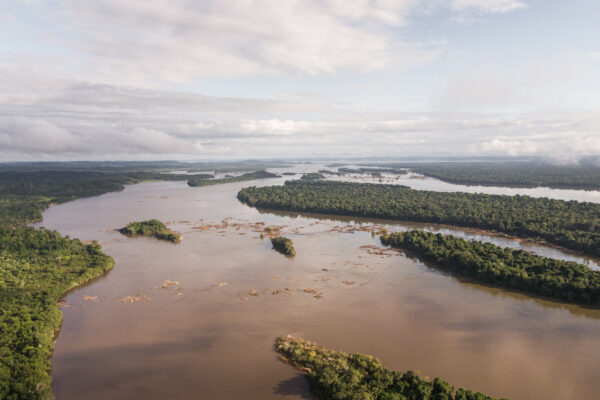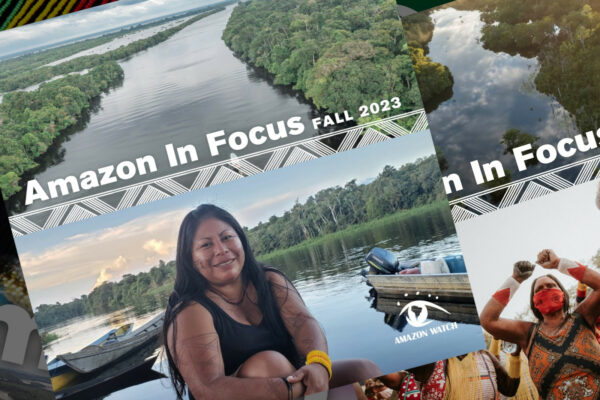Quito, Ecuador – The Confederation of Indigenous Nationalities of the Ecuadorian Amazon (CONFENIAE), the National Federation of Indigenous Nationalities of Ecuador (CONAIE), the Coordinating Body of Indigenous Organizations of the Amazon Basin (COICA), the Waorani Organization of Pastaza (CONCONAWEP), the Indigenous Federation of United Communities of the Ecuadorian Amazon (FCUNAE), and the Alliance of Human Rights Organizations in Ecuador, celebrate the decision of the four European banks (BNP Paribas Group, Credit Suisse, and the ING Group) to exclude Ecuadorian oil trade from their financing portfolios. This crude is extracted from the Amazon and primarily destined for refineries in the U.S. These decisions recognize that in Ecuador, oil companies and the government fail to comply with international environmental and social policies and standards and violate human rights and the rights of nature in the Amazon – one of the most biodiverse areas in the world.
We refute the response from Petroecuador EP in which the Ecuadorian company declared its alleged compliance with all international health, safety, and environmental standards. This shows that Petroecuador is operating with outdated information and a lack of knowledge regarding the protection of the rights of Indigenous peoples and current climate commitments, and is actively preventing the country from complying with them. Petroecuador’s press release presents an industry free of conflict and violations of human rights and rights of nature by ignoring the current state of pollution caused by oil spills. There is no accountability or proper remediation, there is a lack of consultation and consent of Indigenous peoples and nationalities and the forced concession of oil blocks in Indigenous territories, among other issues.
The lived reality of communities in the Ecuadorian Amazon differs from these statements. The open-pit burning of oil waste and spills made possible by the lack of adequate prevention measures contradict Petroecuador’s claims. In the last year, there have been two major oil spills in the northern Ecuadorian Amazon: on April 7 along the Coca and Napo rivers, and on November 27, in the Shiripuno. Both have directly affected the lives of over 120,000 people (Indigenous and non-Indigenous), who depend directly on rivers to live and on the rainforest with which they coexist. The spills also affect isolated Indigenous peoples, whose lives are threatened by pollution, without protection by the government. The first spill occurred precisely because of the negligence of Petroecuador and the OCP consortium.
In 50 years of oil exploitation in Ecuador, no government has developed a consultation and consent processes for oil extraction or any other extractive industry (mining, agribusiness, etc.) to fulfill international standards. This is why, in 2012, the Inter-American Court of Human Rights declared the Ecuadorian government responsible for non-compliance of prior consultation. Despite this, the government has tendered oil blocks without consultation for the past eight years. In 2019, Waorani communities won a historic case against the government that demonstrated Ecuador’s systematic violation of prior consultation and consent, self-determination, and self-government.
While the announcement of the European banks makes it clear that the Amazon is a global priority for humanity, Petroecuador’s statement shows that the Amazon and its protection are not part of the Ecuadorian government’s agenda. “The oil activity does not guarantee life, it does not respect the territories or the populations that inhabit them, and several court decisions have already shown this. If Petroecuador claims to handle 80% of oil production; then, it is the main party responsible for the environmental disaster produced in various areas of the Ecuadorian Amazon”, said Marlon Vargas, president of CONFENIAE.
Petroecuador also mentions that proof of its compliance with current environmental and social regulations are the 250 environmental licenses and the biennial audits it holds. However, this statement and the realities of the communities affected by the company only reveal the lack of policies that effectively regulate the fossil fuel industry. There are no safeguards to guarantee that public and private companies fully comply with international standards and commitments, including those signed and ratified by Ecuador, such as the Extractive Industries Transparency Initiative (EITI) and others associated with the Paris Agreement.
Petroecuador reveals a position that promotes negligence and impunity regarding environmental and social harm generated by oil exploitation in the Amazon. In order to rebuild policies in accordance with the vision of those of us who live in the Amazon and the international policies already in place, the Ecuadorian government must recognize the negative impacts the oil industry has had in our territories, which led to the decision of the banks involved in trade financing.
During the pandemic, Indigenous populations have shown that the only thing that guarantees their lives is the protection of their territories. For this reason, we are emphatic in pointing out that any extractive activities cannot be prioritized over the life of Indigenous and campesino communities and the protection of the environment. Today, oil exploitation in Ecuador does not translate into taxes or profits for the country; on the contrary, it has led to ecocide and genocide. In addition, many oil companies owe back taxes to the government and, in other cases, they have also pursued arbitration claims against the government, leaving multimillion-dollar debts, such as Perenco in two cases, among others.
Our organizations propose that the Ecuadorian government pursue another path:
- Stop the destruction of natural resources and protect strategic ecosystems, especially the Amazon region, as a mechanism to mitigate climate change.
- End the tender of the Sacha oil concession announced on the same day that three European banks made public their commitment to stop financing the Ecuadorian oil trade. The announcement of this concession is not strategic in the current context where financiers are exiting from oil investments in Ecuador.
- The immediate declaration of a moratorium on oil activities in the Amazon. This implies not authorizing new oil concessions nor seeking new investments in accordance with the climate emergency. The extraction of resources in the Amazon is not economically or socially viable, it only produces destruction, social conflicts, disease, and death. The banks’ decision is a recognition of the end of the extractivist model in our country.
- Finally, we urge the other banks, UBS and Natixis, that have not yet made a shift of policy, to follow the decisions of BNP Paribas, Credit Suisse, and ING Group as a way to ratify their commitments to the environment and human rights.













